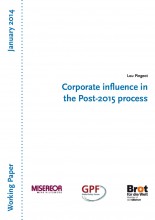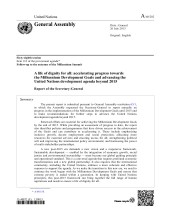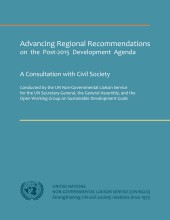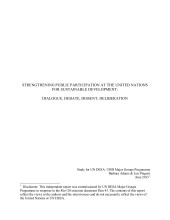The basic parameters of the future development agenda were laid out at the autumn session of the UN General Assembly. The roadmap was presented and initial answers given as to where the global journey should be taking us from 2015 on. The train to genuine sustainability could soon jump the tracks. Moreover After four UN reports, their is no mention of the need to transform financial, trade and economic relations to reduce glaring inequalities, says Swiss coalition Alliance Sud in [...]
Sustainable Development & Human Rights - Archive
In a new working paper, GPF's Lou Pingeot discusses the influence of transnational corporations in the Post-2015 process. This working paper by Brot für die Welt, Global Policy Forum and Misereor provides an overview of the main corporate actors in the post-2015 process and how they shape the discourse on development. The paper advocates for more transparency around the participation of corporations in UN processes, including their financial support to UN initiatives, and for more reflection on the risks of [...]
The International Budget Partnership (IBP) has launched a special issue of its newsletter that focuses on budgeting for environmental sustainability. In his contribution, Jens Martens, Director of the Global Policy Forum lines out the idea of 'Sustainable Development Budgets' and their key role as an integral part of the post-2015 agenda. Moreover articles include examples of what countries are doing to “green” their budgets in Philippines and Canada and what shall be done about environmentally harmful subsidies.
Assessing how loans are reported as development aid
A new report by Eurodad's Stéphanie Colin deal with the issue of concessional loans in development finance. In the context of tighter budgets in OECD-DAC countries governments are looking for methods to increase official development assitance (ODA) levels without budgetary implications. One way of doing this is reporting a larger share of loans to developing countries as ODA. Other measures in this directions are ideas to leverage development resources by 'blending' public with private funds. The report discusses the main [...]
As governments meet at the United Nations this week to debate aspects of the sustainable development agenda to replace the Millennium Development Goals (MDGs) in 2015, over 300 civil society organizations from all parts of the world have come together to demand human rights be integrated into every aspect of the new framework. Together they have issued a joint statement, advanced by a caucus of human rights organizations convened by the Center for Economic and Social Rights (CESR), Amnesty International [...]
UN expert on WTO Summit
GENEVA (2 December 2013) – The United Nations Special Rapporteur on the right to food, Olivier De Schutter, today called for developing countries to be granted the freedom to use food reserves to help secure the right to food, without the threat of sanctions under current World Trade Organization (WTO) rules.
Mr. De Schutter’s call comes on the eve of a high-level WTO summit in Bali, Indonesia, (3-6 December) which will try to reach agreement on proposals on developing countries’ [...]
"Progress And Challenges Regarding The Future We Want"
The 2013 World Conference of Indigenous Women "Progress and Challenges Regarding the Future we Want" held from October 28-30 2013, in Lima, Peru, was attended by about 300 Indigenous women leaders from Africa, Asia, Latin America, North America, the Artic, Russia and the Pacific. AWID's Gabriela De Cicco has conducted an interview with Mirna Cunningham Kain, President of the Permanent Forum on Indigenous Issues, and AWID Board Member, about the conference, their agreed agenda and the issues Indigenous women consider [...]
Demand human rights-consistent tax policies
The tax structure and the level of revenue collection, budget allocations and expenditure influence the ability of governments to fulfill their human rights obligations and tackle discrimination and structural inequalities. The UN Special Rapporteur on extreme poverty and human rights, Magdalena Sepúlveda Carmona, is preparing to submit a report concerning fiscal and tax policy, poverty and human rights. Governments have been asked to respond the questionnaire prepared by the Special Rapporteur in order to gather information on domestic fiscal and [...]
In a new blog entry for rightingfinance, Aldo Caliari takes a deeper look into the human rights implications of the MDGs, MDG 8 to be more specific: "How much did MDG 8 respond to human rights imperatives and how far did its implementation go in promoting human rights? What historical and legal trends were the backdrop to MDG 8 and what hope can we bear for the future as the international community evaluates a potentially new generation of development goals?" [...]
The United Nations' Sixth High-Level Dialogue on Financing for Development (FfD) that took place in New York in early October shows a deep rift between developing and developed countries. This dialogue was mandated to look at the FfD Agenda's status of implementation and the tasks ahead. While the EU thinks it contributed at least its fair share, developing countries pointed to the major failures in implementation of aid, debt or trade commitments. The future of the FfD process remains unclear [...]
Harris Gleckman has published an article titled ‘ECOSOC’s New Role and Its Old Culture’. The article written for iisd surrounds the extensive reforms made to the Economic and Social Council (ECOSOC). After the latest reform resolution, four distinct new elements to ECOSOC have appeared following the governments agreement on new operating rules for the council.
The Working Group on "Financing for sustainable development" of the socalled UN System Task Team (UNTT) has issued four background papers for the Intergovernmental Expert Committee on Sustainable Development Financing and its deliberations surrounding the post-2015 UN development agenda. Paper #1 reviews investment requirement estimates that have been published over the last decade for nine sectors; paper #2 takes stock of national, regional and international public sources for sustainable development finance; paper #3 examines the challenges in raising private sector [...]
For a transformative shift in gender equality in Post-2015 Era
The Women’s Major Group (WMG) responds to the Special Event convened by the President of the UN's General Assembly to review progress towards the achievement of the Millennium Development Goals, and to chart the way forward. In acknowledging the achievements the Women's Major Group is nevertheless greatly concerned that without a transformative shift in the way that gender equality and women’s human rights and justice concerns are articulated, a truly sustainable post-2015 Development agenda will not be achieved.
The United Nations Special Rapporteur on extreme poverty urges States to recognize and value unpaid care work, and ensure it is better supported and more equitably shared between women and men. The UN expert states that the unequal distribution of unpaid care work, fueled by damaging gender stereotypes, is a major human rights issue. Therefore it was put on the Agenda of UN meeting in Geneva on the International Day for the Eradication of Poverty.
Will the poor be short-changed?
The OECD Development Assistance Committee (DAC) is currently reviewing the rules to report donors’ loans as Official Development Assistance (ODA). This discussion is taking place against a backdrop of aid cuts across Europe and raises concerns about the intentions of DAC donors. There are risks that the poor will be short-changed if the new rules make it easier for donors to inflate their aid figures further without making fresh money available and that debt sustainability will be undermined if loans [...]
Construction of a mega-steel plant in Odisha in Eastern India should be halted immediately, United Nations independent human rights experts have urged, citing serious human rights concerns. The project reportedly threatens to displace over 22,000 people in the Jagatsinghpur District, and disrupt the livelihoods of many thousands more in the surrounding area.
Although the Arab NGO Network for Development (ANND) welcomes the report and joins to the general call towards a life of dignity for all by the UN's Secretary General it mentions shortcomings and deficits in a newly announced comment. Amongst others ANND is concerned with the lack of interlinkages between development and trade on the one hand and Human Rights and trade on the other and calls to implement the Guiding Principles on Business and Human Rights.
UN-NGLS has launched a report on the post-2015 development agenda which entailes a four-month consultation with 120 regional civil society networks (and includes statements from GPF). Together the networks have come up with four objectives surrounding justice, human rights, the equal distribution of resources and accountability/transparency. The report adds a more critical perspective to the recommendations by the SG's High Level Panel, the Sustainable Development Solutions Network and the Global Compact.
Asia Development Alliance (ADA) composed of development CSO/NGO platforms in Asia comment on the 2nd Regional Consultation on Post-2015 development agenda on UN level. In their newest statement ADA welcomes the way taken and formulates demands such as a need to give priority to least developed countries, landlocked developing countries, small island developing countries as well as fragile and conflict-affected countries in the Post-2015 development agenda.
The long awaited work of an experts committee on sustainable development financing, a key outcome of the Rio+20 United Nations conference, has finally started. The Intergovernmental Committee of Experts on Sustainable Development Financing held its first session on 28-30 August at the UN headquarters in New York. However, contrary to most multilateral discussions and intergovernmental processes in the UN, the session was closed to not only external stakeholders but also the Member States that are not part of the Committee [...]
on the Follow-up to the outcome of the Millennium Summit, “A life of dignity for all: accelerating progress towards the Millennium Development Goals and advancing the United Nations development agenda beyond"
Women's Major Group, representing 500 women's organizations form all around the world, today addressed UN Secretary-general Ban Ki Moon with regard to his report to the 68th General Assembly on the progress towards the MDGs and the UN's development agenda beyond 2015. In the letter, which is supported more than 50 civil society groups (including GPF), the coalition calls for a stronger recognition of women's rights in the debated post 2015 development agenda as well as for a meaningful approach [...]
The First session of the Regional Conference on Population and Development in Latin America and the Caribbean took place in Montevideo, 12-15 August 2013 with great attendance of women’s rights activists from the region. In this context AWID (Association in Women’s Rights in Development) identifies universal access to health, sexual and reproductive rights, and gender equality as key elements for the Post-2015 agenda on sustainable development.
ANND Statement
The Arab NGO Network for Development (ANND) has issued a statement regarding their perspective of the current developments in Egypt. ANND describes the efforts they have made in achieving public democracy, social justice and stability during the unrest being faced in the Arab community. The network stresses the importance of ending all violence from conflicting sides to provide a safe basis to encourage economic and political development in Egypt. They recognize that the media has been adding to the cause [...]
Mixed report card
The European Commission’s recent accountability report and communication on financing for development highlights the importance of domestic resource mobilisation, tackling illicit financial flows and meeting aid promises.
But it contains no substantive new commitments, ducks issues of wider systemic reform and adopts an alarmingly one-sided endorsement of stepping up the use of public money to leverage private finance. These are the conclusions of an article written by Jesse Griffiths, Øygunn Sundsbø Brynildsen, Jeroen Kwakkenbos, María José Romero and Bodo Ellmers [...]
DIALOGUE, DEBATE, DISSENT, DELIBERATION
In a report commissioned by UN DESA/DSD Major Groups Programme in response to the Rio+20 outcome document, Barbara Adams and Lou Pingeot (Policy Advisors at GPF but acting in their personal capacities) take stock of the reviews of the history of Major Groups' engagement with the Commission on Sustainable Development (CSD) and highlight examples of best practices that were deemed successful and efficient and those that did not work. Furthermore, they identify lessons learned from the experience and concerns raised [...]





